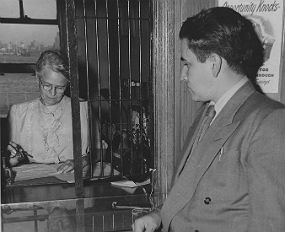In Carlson v. Landon, 342 U.S. 524 (1952), the Supreme Court upheld a decision by the attorney general, as executive head of the Immigration and Naturalization Service, to detain resident aliens without bail, pending a determination on deportability.
The case involved the arrest of detainees under the Internal Security Act of 1950, also known as the McCarran Act, for membership in or ties to the Communist Party of the United States. The Court’s 5-4 decision upheld the detention of all but one of the aliens.
Court said alien residency was subject to government discretion
In the opinion for the Court, Justice Stanley F. Reed portrayed residence of aliens in the United States as a privilege rather than a right and stated that the government had not abused its discretion in this case.
He wrote, “As all alien Communists are deportable, like Anarchists, because of Congress’s understanding of their attitude toward the use of force and violence in such a constitutional democracy as ours to accompany their political aims, evidence of membership plus personal activity in supporting and extending the Party’s philosophy concerning violence gives adequate ground for detention.”
Black’s dissent focuses on freedom of ‘thought, speech and press’
In dissent, Justice Hugo L. Black argued that the government had violated the First (“thought, speech and press”), Fifth (due process), and Eighth (bail) Amendments and asserted that if the McCarran Act gave discretion to anyone, it limited it to the attorney general.
Black maintained that “the First Amendment grants an absolute right to believe in any governmental system, discuss all governmental affairs, and argue for desired changes in the existing order.”
He further observed that “those who wrote and adopted our First Amendment weighed those dangers [of liberty] against the dangers of censorship and deliberately chose the First Amendment’s unequivocal command that freedom of assembly, petition, speech and press shall not be abridged.”
Justice Felix Frankfurter’s dissent focused on the government’s generalized assumption of guilt.
Like Black, Justice William O. Douglas did not think that aliens could be detained or expelled “for their past actions or present expressions unaccompanied by conduct.”
Justice Harold H. Burton’s dissent focused on the bail provision of the Eighth Amendment.
John Vile is professor of political science and dean of the Honors College at Middle Tennessee State University. He is co-editor of the Encyclopedia of the First Amendment. This article was originally published in 2009.

